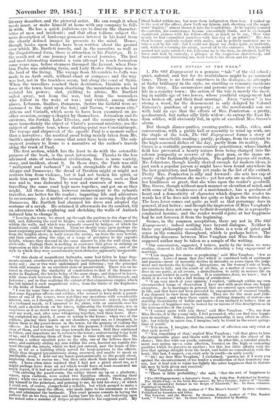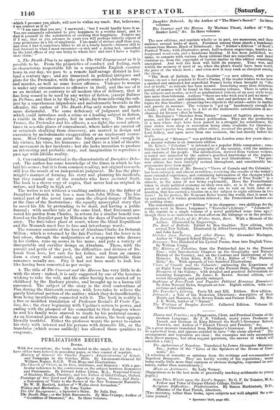FOUR NOVELS OF THE WEER. *
l. The Old Engagement is a genuine " tale " of the old school ; quiet, natural, and but for its truthfulness might be pronounced tame. There is no forced smartness in the dialogue, no attempts at flashy brilliancy in the style, no startling or romantic incidents in the story. The occurrences and persons are those of everyday life in a country town ; the action of the tale is merely the meet- ing in middle age of two lovers, whose youthful engagement had been broken off, and their final marriage. Even " action " is too strong a word, for the denouement is only delayed by Colonel Estcourt's purchase of a property ; as the novel-reader can see with half an eye that the efforts of Mrs. Pemberton—a pretty, goodnatured, but rather silly little widow—to entrap the East In- dian soldier, will obviously fail, in spite of excellent Mrs. Grove's alarm.
But though dinner-parties, evening-parties, walks, rides, and conversation, with a public ball or assembly to wind up with, are the staple of the book, The Old Engagement forms a story of pleasant unexcitable reading ; partly, perhaps, from its contrast to the high-seasoned dishes of the day, partly from its reality. Dr. Grove is a veritable prosperous country practitioner, whose limited field has prevented a hearty nature from being changed into the solemn pomposity or reserve of the great man, or the inane ur- banity of the fashionable physician. The gallant joyous old rector, Mr. Johnstone, though hardly clerical enough for modern ideas, is just such a popular parson as might have been found anywhere in the last generation, and hardly yet ranks in the list of the extinct. Pretty Mrs. Pemberton is silly and forward : she sets her cap at every single gentleman she meets ; yet her arts are so obvious, and her kindliness so great, that she wins upon the reader's goodwill. Mrs. Grove, though without much manner or elevation of mind, and with some of the weaknesses of a matchmaker, has a goodness of heart and a domesticity of character which dispose the reader to- wards her if he does not rank her quite so high as the writer does. The hero lover comes out quite as well as that personage does in general, if not better; and though the impression of Miss Vaughan's fascinations does not come up to their description, she is a properly- conducted heroine, and the reader would rejoice at her happiness had he not foreseen it from the beginning.
Scenes, in the common acceptation, there are not in The Old Engagement: indeed nothing rises beyond dialogue. Neither is there any philosophy so-called ; but there is a vein of quiet good sense in the remarks throughout, which is perhaps better. The following discourse between Miss Vaughan and Miss Brooke the supposed author may be taken as a sample of the writing.
" Our conversation, suggested, I believe, partly by the fiction we were reading, chanced to fall on the difficulties attending a long engagement of marriage. " can imagine few states so perplexing,' said Miss Vaughan, few so precarious. Love—I mean that love which is combined both of sentiment and passion—must of necessity decline in intensity as years ripen the judg- ment and moderate the feelings. Attractions, on the woman's side at least, are certain to fail ; and the result of all this, as a matter of course, to pro- duce in one party, at all events, a disinclination to ratify in mature life an engagement formed in early youth. It is sometimes done, we know ; but I doubt if it ever be with a full feeling of satisfaction.'
" am very much of your opinion,' I replied, although within my own circumscribed range of observation I have met with more than one happy exception. As to marriages in general that are entered upon somewhat late in life, and that have not been preceded by engagements of unusual length, I am disposed to view them favourably. They are for the most part judi- ciously formed; and where there exists no striking disparity of station—no startling dissimilarity of habits and tastes—I am inclined to believe that as fair a share of happiness may be looked for in unions of this description as in the love-matches of the young.' " 'I cannot agree with you there,' said Miss Vaughan. No, my dear Miss Brooke, it is the young only, I feel persuaded, who can find true happi- ness in marriage. Solace, protection, companionship, it may afford in after- life; but felicity in union can, I imagine, only be found in the sweet spring- time of youth.' " You mean, I imagine, that the romance of affection can only exist at that early period ?' " Yes, something of that,' replied Miss Vaughan; 'all that gives to love the inexpressible grace and charm with which it invests the object of its choice; this dies with our youth, certainly. In after-life, a rational attach- ment may spring up—a calm affection, founded on the high or endearing qualities which we perceive in another ; but this has little affinity with the love that springs straight from the heart, and holds no consultation with the head; this last, I suspect, can exist only in youth—in early youth.' " 'Ah ! my dear Miss Vaughan,' I exclaimed, 'pardon me if I warn you against the encouragement of too tender a recollection of that transitory sea- son, lest it lead you to value too lightly the sober happiness that in mature life may be both given and received.' " Miss Vaughan coloured. "'There is little probability,' she said, 'that the sort of happiness to
*The Old Enragement; a Spinster's Story. By Julia Day. Published by Bentley_ The Death-Flag; or the Irish Buccaneers. By l‘Liss Crumpe, Author of " Gerald- ine of Desmond,' or Ireland in the Reign of Elizabeth," &c. In three volumes. Published by Shoberl.
Daughter Deborah. By the Author of " The Miser's Secret." In three volumes. Published by Saunders and Otley. The Convent and the Harem. By Madame Pisani, Author of " The Banker Lord," " Vandeleur," &c. In three volumes. Published by Bentley.
,Which I.presunie you allude, will now be within my reach. Tut, believeme, :Fum content as it is." " am sure that you are,' I answered ; 'but I would hardly have it so.,
'You are eminently calculated to give happiness to .a worthy heart, and to ..find it yourself in the satisfaction of creating that happiness. Forgive me if 'I say, that as you advance in years you will perhaps bitterly repent of your persistence in a life of singleness. I. am made of sterner stuff than you, and even I find it sometimes bitter to sit at a lonely hearth—bitterer still to look forward to what I must encounter—a sick and a dying bed, unsoothed by the kind offices of any one being to whose love and care I have a legiti- mate claim.' " 2. The Death-Flag is as opposite to The Old _Engagement as it is possible to be. From the proprieties of conduct and feeling, such as characterize respectable life in a respectable English country town in our day, we pass to a remote half-savage district in Ire- . land a century agoand are immersed in political intrigues and plots for the Pretender, with the private crimes of abduction, rape, and murder, as well as some lesser offences. Violence to woman is under any circumstances so offensive in itself,. and the use of it as an incident so contrary to all modern idea of delicacy, that it lhas long ceased to be used by any writer of fiction, (except Bulwer in Pe/ham, and that is by the by,) while, far from relieving the sub- ject by a superhuman impudence and melodramatic bravado in the offender, the author of The. Death-Flag only renders the matter more distasteful. The same deficiency of judgment and taste which could introduce such a crime as a leading subject in fiction, is visible in the other parts, but in another way. The court of France, the Pretender and his officers, a sea-fight, the usual adven- tures in sea-side places of concealment, where ladies are carried off or criminals skulking from discovery, are marred in design and execution by melodramatic exaggeration or an unpleasant coarse- ness. Miss Crumpe can paint the Irish peasant well enough in his virtues, his vices, his humours ; and there is a kind of theatri- cal movement in her incidents ; but she lacks invention to produce an interesting and probable story, and imagination to reproduce a past age with lifelike reality.
3. Conventional historical is the characteristic of Daughter Debo- rah. The author has some knowledge of the times in which he has laid his scenes ; but it is from common reading, not original research, still less the result of an independent judgment. lie has the play- wright's manner of forming his story and planning his incidents, but they remind one of the numbers who have imitated Scott. The book is a clever copy of copies, that never had an original in nature, and hardly in high art.
The writer is not without a vaulting ambition ; for the father of Daughter Deborah is no less a man than John Milton. The his- torical part of the novel turns upon the alleged danger of Milton at the time of the Restoration ; the equally apocryphal story that he saved his life by pretending to be dead, and having a public funeral ; with another tale of the same kind, that Davenant pro- cured his pardon from Charles, in return for a similar benefit con- ferred on the Royalist poet by Milton in the days of Puritan ascend- ancy. The finis takes place at court, where the blind Republican and the Monarch meet face to face and interchange words.
The romance consists of the love of Abraham Clarke for Deborah ; which is returned by the fair Puritan; but the lover is in bad odour, through the malpractices of a scapegrace who dresses in his clothes, runs up scores in his name, and puts a variety of disreputable and cavalier doings on Abraham. These, with the pursuit and perils of the poet, the difficulties and distress of De- borah from love, her care for her father, and from an enemy, form a story well contrived, and not more improbable than .romances usually are. Pity it had not been made to look less like having been concocted as per recipe.
4. The title of The Convent and the Harem has very little to do with the story : indeed, it is only suggested by one of the heroines wishing to take the veil, and the other having been carried off in childhood by the Barbary pirates, and brought up in a harem till ransomed. The subject of the story is the civil contentions of Pisa during the thirteenth century, with love-tales to relieve the purely historical portion of the matter ; which they do insufficiently, from being inextricably connected with it. The book in reality is a free or modified translation of Professor Rosini's Il Conte Ugo- &e. ; the story beginning with Ugolino's return to power, and ending with the prospect of his committal to that dungeon where
• he and his family were starved to death by his prelatical enemy. As an historical picture of the age and its actors, the book appears literally truthful. Either the professor wants the power to endow his story with interest and his persons with dramatic life, or the translator (which seems unlikely) has allowed those qualities to evaporate.



























 Previous page
Previous page